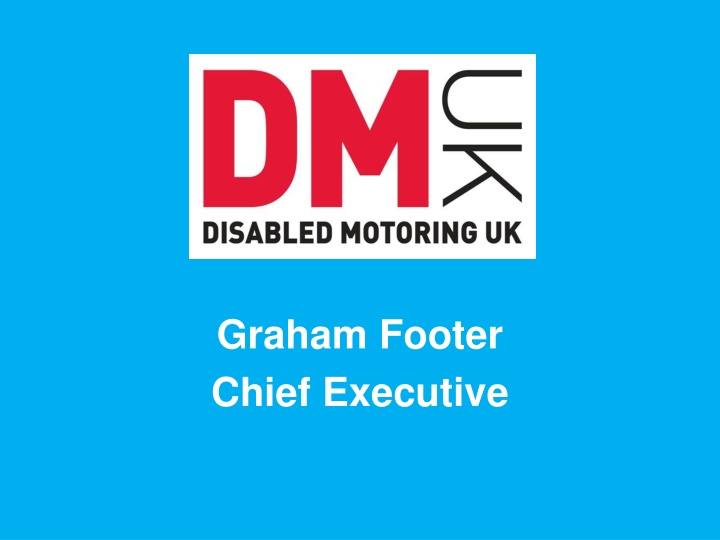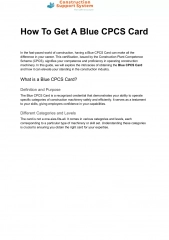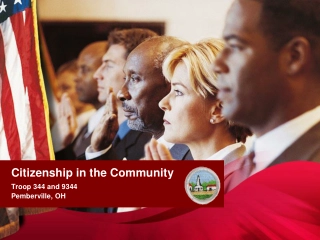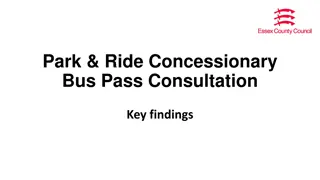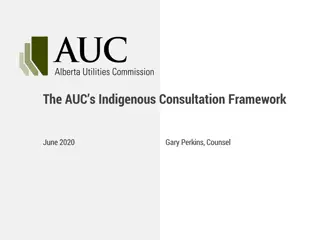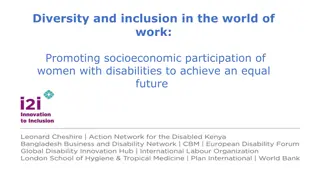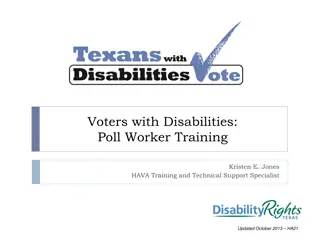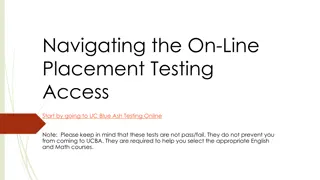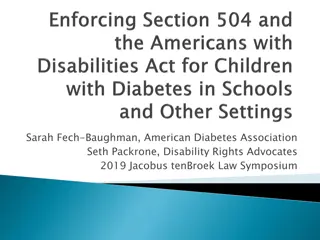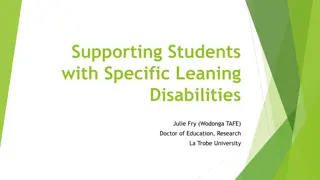Blue Badge Consultation: Ensuring Access for Hidden Disabilities
This consultation by the Department for Transport aims to improve Blue Badge access for people with hidden disabilities. It delves into eligibility criteria, proposing changes to expand access and clarity. The DMUK shares support and concerns regarding the consultation process and potential outcomes, advocating for better understanding of current criteria.
Download Presentation

Please find below an Image/Link to download the presentation.
The content on the website is provided AS IS for your information and personal use only. It may not be sold, licensed, or shared on other websites without obtaining consent from the author.If you encounter any issues during the download, it is possible that the publisher has removed the file from their server.
You are allowed to download the files provided on this website for personal or commercial use, subject to the condition that they are used lawfully. All files are the property of their respective owners.
The content on the website is provided AS IS for your information and personal use only. It may not be sold, licensed, or shared on other websites without obtaining consent from the author.
E N D
Presentation Transcript
Graham Footer Chief Executive
Department for Transport Blue Badge Eligibility Consultation
BACKGROUND The consultation ran from 21stJanuary 2018 to 18thMarch 2018. The DfT is committed to look again at how the scheme works for people with hidden disabilities, to ensure that the rules and guidance are clear and that those with the greatest needs have access to a Blue Badge. This is in accordance with the Governments manifesto commitment to give parity of esteem to mental and physical health conditions.
EXECUTIVE SUMMARY There are currently 2.4 million Blue Badges issued in England. The DfT is concerned that the application process for people with non-physical disabilities is not clearly understood or administered consistently across the country. The DfT is committed to clarifying the regulations and guidance, ensuring that any equality issues are addressed and that there is parity for physical and non-physical disabilities.
THE CONSULTATION PROPOSITION Expand eligibility by changing the criteria. Introduction of a non-independent Eligibility Assessor. Linking automatic eligibility to PIP activity Planning and Following Journeys for those who score 12 points.
DMUK POSITION It is without doubt that some people with certain mental health conditions and those with other hidden disabilities would benefit from ownership of a Blue Badge. DMUK supports this and welcomes it. The current eligibility criteria already allows for this and we would argue that change is not needed, just better understanding and guidance of the current eligibility criteria. The consultation was launched before any research or impact assessments were carried out regarding the effects the changes would have. This is clearly putting the cart before the horse.
DMUK CONCERNS Was this a genuine consultation or an exercise to go through the motions? Will the DfT listen and take heed of the responses? Will the necessary research and impact assessments now take place once all responses have been collated? If not the consequences could be very serious for everyone.
DMUK PROPOSITION CONCERNS If the current proposition goes through, there could be a significant increase in the number of Blue Badge applications. This could result in many more Blue Badges being issued and pressure on disabled parking will increase significantly. Parking on street on single and double yellows lines could increase significantly which could cause traffic flow problems in urban areas.
CONCERNS WITH PROPOSITION (cont.) If the changes are rolled out unchecked the scheme could end up disadvantaging those who it was set up for in the first place. There is already a chronic lack of enforcement and disabled bay provision in some areas of the country which needs to be addressed first. Without a truly independent Eligibility Assessor the scheme will be going backwards.
THE NEW ELIGIBILITY CRITERION Changing one word makes a world of difference when it comes to interpretation. The proposition is to change the word in to when . If that happens it will be a game changer. Without very specific and clear guidance of what that means, it could cause even more ambiguity around eligibility. The opposite of what DfT are trying to achieve .
ELIGIBILITY ASSESSOR The consultation proposed that the Eligibility Assessor no longer has to be independent. DMUK believes this would be a backward step and that Eligibility Assessors should remain independent. There is no genuine reason why this cannot continue to be the case.
LINKING AUTOMATIC ELIGIBILITY TO PIP The proposal is to link eligibility to those who have 12 points in the planning and following journeys descriptor of PIP. It is already linked to PIP under the moving around descriptor within PIP for those with 8 points or more. The proposed change is unnecessary and could again lead to a steep increase in Blue Badge holders.
WHAT NEEDS TO HAPPEN? DfT needs to carry out a comprehensive review of the scheme and address the current deficiencies which are identified. Carry out an impact assessment of the proposition and its probable long term effects on the scheme. Give Local Authorities more support in terms of guidance, provision and enforcement. Take an holistic approach to the subject.
WHAT WE NEED TO KNOW When and how would the changes take effect? What is the estimated increase in demand for Blue Badges likely to be? What are the DfT plans regarding parking provision? What are the plans to address the lack of enforcement?
MENTAL HEALTH STATISTICS In England there are approximately 1,191,000 people with a learning disability of which 905,000 are adults aged 18+. 530,000 men and 375,000 women. There are 700,000 people with Autism in the UK There are 850,000 people with Dementia in the UK. This is expected to rise to 1Million by 2025.
MENTAL HEALTH STATISTICS (Cont.) Analysis of 2014/15 Health and Social Care Information Centre data shows that almost two million people (1,835,996) were in contact with mental health and learning disability services at some point in the year, an increase of 89,298 (5.1 per cent) on the previous year. This means that 3,617 people per 100,000 of the population in England accessed mental health and learning disability services (approximately one person in 28). Over one million women (1,004,227) were in contact with mental health and learning disability services in 2014/15. This is higher than the number of men (829,677) and equates to 54.7 per cent of the total number of people over the year. (source: Mental Health Network, NHS Confederation 2016) Many people with mental health problems will be seen mainly by their GP. According to a Care Quality Commission (CQC) report from 2015, at any given time an average of one in four patients of a fulltime GP requires treatment for a mental health condition. There were nearly three million adults on local GP registers for depression in 2013/14, and nearly 500,000 people on GP registers for a serious mental illness. (source: Mental Health Network, NHS Confederation 2016)
MENTAL HEALTH (Cont.) Psychotic disorder 0.7 in 100 people Bipolar disorder 2.0 in 100 people Antisocial personality disorder 3.3 in 100 people Borderline personality disorder 2.4 in 100 people Depression 3.3 in 100 people Post traumatic stress disorder (PTSD) 4.4 in 100 people Panic disorder 0.6 in 100 people Phobias 2.4 in 100 people Mixed anxiety and depression 7.8 in 100 people (Source: Mind. February 2018)
NEXT STEPS DMUK wants to work with LA s and the DfT to work towards the right outcomes for everybody. DMUK will continue to lobby on behalf of Blue Badge holders and voice their concerns. DMUK will attempt to communicate and contribute where possible.
THANK YOU FOR LISTENING For more information about Disabled Motoring UK please contact us: National Headquarters Ashwellthorpe Norfolk NR16 1EX 01508489449 www.disabledmotoring.org
